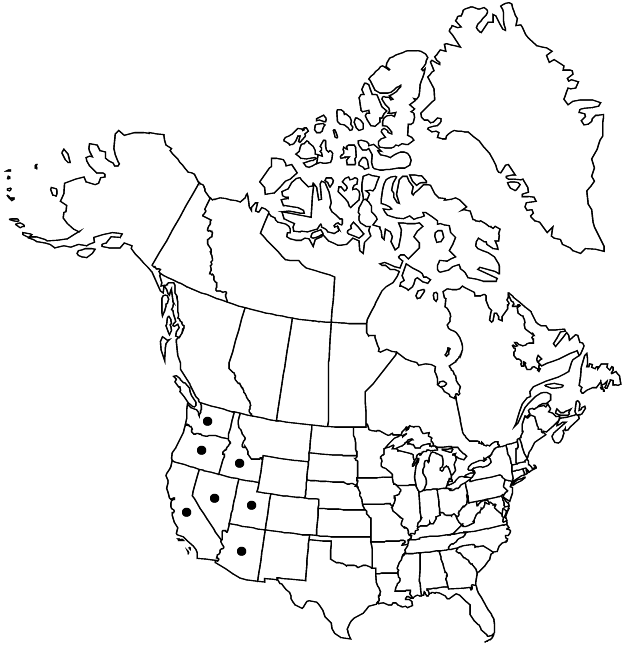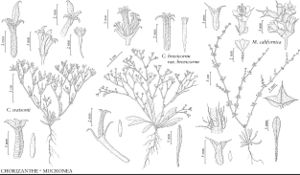Difference between revisions of "Chorizanthe watsonii"
Proc. Amer. Acad. Arts 8: 199. 1870.
FNA>Volume Importer |
imported>Volume Importer |
||
| (One intermediate revision by one other user not shown) | |||
| Line 8: | Line 8: | ||
}} | }} | ||
|common_names=Watson’s spineflower | |common_names=Watson’s spineflower | ||
| + | |special_status={{Treatment/ID/Special_status | ||
| + | |code=F | ||
| + | |label=Illustrated | ||
| + | }}{{Treatment/ID/Special_status | ||
| + | |code=E | ||
| + | |label=Endemic | ||
| + | }} | ||
|basionyms= | |basionyms= | ||
|synonyms= | |synonyms= | ||
| Line 46: | Line 53: | ||
|publication title=Proc. Amer. Acad. Arts | |publication title=Proc. Amer. Acad. Arts | ||
|publication year=1870 | |publication year=1870 | ||
| − | |special status= | + | |special status=Illustrated;Endemic |
| − | |source xml=https:// | + | |source xml=https://bitbucket.org/aafc-mbb/fna-data-curation/src/2e0870ddd59836b60bcf96646a41e87ea5a5943a/coarse_grained_fna_xml/V5/V5_982.xml |
|subfamily=Polygonaceae subfam. Eriogonoideae | |subfamily=Polygonaceae subfam. Eriogonoideae | ||
|genus=Chorizanthe | |genus=Chorizanthe | ||
Latest revision as of 22:15, 5 November 2020
Plants spreading to erect, 0.2–1(–1.5) × 0.2–1(–1.5) dm, densely canescent-strigose. Leaves basal or nearly so; petiole (0.5–)1–2.5(–3) cm; blade oblanceolate, (0.3–)0.5–1.5(–2) × 0.2–0.4(–0.5) cm, thinly floccose to sparsely tomentose. Inflorescences with involucres in small clusters 0.5–1 cm diam., greenish to reddish; bracts 2, with laminar ones oblanceolate, (0.5–)0.8–1.5(–2) cm × (1–)2–4 mm, those at distal nodes becoming sessile, reduced and scalelike, linear-lanceolate, acicular, awns slightly curved, 0.5–1 mm. Involucres 1, green, cylindric, 5-ribbed, 3–4.5 mm, finely corrugate, pubescent; teeth 5, erect, unequal, with leaflike, narrowly lanceolate, 2–6 mm anterior tooth, others linear, 1–2 mm; awn uncinate, 0.4–0.8(–1) mm. Flowers 1, included to slightly exserted; perianth yellow, cylindric, 1.5–2.5 mm, thinly pubescent abaxially; tepals connate ca. 2/3 their length, monomorphic, oblong, acute, entire apically, mostly erect; stamens 3 or 9, slightly exserted; filaments distinct, 0.8–1 mm, glabrous; anthers yellow, ovate, 0.2–0.3 mm. Achenes brown, lenticular, 2.5–3 mm.
Phenology: Flowering Apr–Aug.
Habitat: Sandy to gravelly flats and slopes, mixed grassland, saltbush and sagebrush communities, pinyon-juniper woodlands
Elevation: 300-2400 m
Distribution

Ariz., Calif., Idaho, Nev., Oreg., Utah, Wash.
Discussion
Chorizanthe watsonii is widely distributed in the cold desert of the Great Basin and in the northern part of the warmer Mojave Desert. Plants in the northern part of the range (especially on the Palouse Prairie of south-eastern Washington) usually have three stamens.
Selected References
None.
